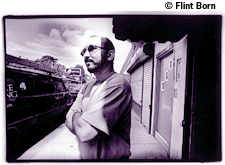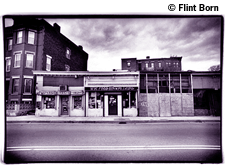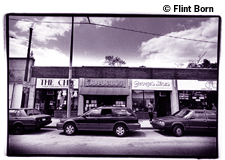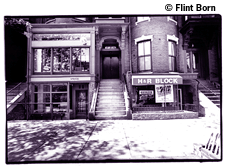May 18 - 25, 2000
![[City scape]](/standard/image/headers/cityscape_header.gif)
Reviving Roxbury
An innovative program aims to help Roxbury thrive and resist gentrification
by Laura A. Siegel
Roxbury's hot. Crime is down, despite a recent headline-grabbing murder. Storefronts are full. Former residents are moving back. Developers are racing to build.
Roxbury, a largely lower-income neighborhood once plagued by drugs, crime, and negative preconceptions fueled by racism, is struggling with the mixed blessings of gentrification. Although community activists are happy to see the revival of this long-neglected neighborhood, no one wants to see long-time residents and business owners shoved aside. Toward that end, a pilot program aims to keep local business owners from being pushed out by deep-pocketed national chains. In the meantime, Roxbury's rebirth continues. Million-dollar development projects are under way; one of the city's most polluted sites -- located in Dudley Square -- is getting a makeover; and, perhaps most telling, Starbucks has come knocking. Next thing we know, someone will give this blossoming urban oasis a hipper-than-thou nickname. Rx, anyone? Up and coming
But the booming economy threatens much of what makes Roxbury a community. Commercial rents are shooting so high that many local business owners fear they'll have to move out.
A new pilot program aims to help them stay. Using an unusual financing technique, Nuestra Comunidad, a local community-development corporation (CDC), will help entrepreneurs buy their own buildings. It's part of a shift that's taking the focus of community development from housing, its traditional territory, to commercial development, a new frontier.
The first lucky entrepreneur will be Hector Piña, who has owned the Merengue restaurant on Blue Hill Avenue for six years. It's one of the few sit-down restaurants in the neighborhood. Dominican and Puerto Rican musicians stop by when they're in Boston -- and so does Red Sox pitcher Pedro Martinez. Their signatures adorn the walls, along with instruments such as the tambora, a double-headed drum, and the guira, a cylindrical metal scraper. Locals gather there too -- so many that Piña needed to move to a bigger space. But he couldn't find anything big enough or in good enough condition in his neighborhood, and he was considering moving elsewhere.
Then Nuestra stepped in. Using federal funds and its own money and expertise, the nonprofit is helping Piña refurbish and eventually buy the derelict building next to Merengue's current space. Instead of lending Piña the money and collecting it in monthly installments with interest, Nuestra is acting as a joint partner. That means that Nuestra will own a percentage of the building, and Piña will buy it from Nuestra over time. The group will profit from the deal only if the building rises sharply in value. There's a good chance Nuestra will lose money. But making money isn't the goal of the equity program: the CDC's mission is to help a thriving local business stay in Roxbury.
This "community-development venture capital" is a lot like the venture capital that fuels the Internet revolution -- only instead of giving dot-coms cash and advice in anticipation of dramatic profits when they go public, these venture capitalists help businesses in disadvantaged neighborhoods.
Nuestra's program is unique in its focus. "Most equity funds are for business, not for real-estate development," explains Evelyn Friedman-Vargas, executive director of Nuestra Comunidad. That's because equity investment in a business can pay off big, but equity investment in real estate rarely does -- not if you want to keep it affordable. That makes it an especially appropriate use of government and nonprofit resources.
Now that the complex finance structure has been worked out, Friedman-Vargas is eager to expand the program. It's a model for how flourishing neighborhoods can help local entrepreneurs stay put.
Roxbury is booming for good reason. Violent crime fell 39 percent between 1994 and 1999, and homicides fell from 38 in 1995 to 10 last year. Real-estate prices are rising due to sky-high rates throughout Boston, which have pumped up demand in cheaper areas such as Roxbury. And the city and federal governments have invested more than $72 million in improvements and projects on Blue Hill Avenue in the past six years. "When I started there was only the convenience store across the street and crack houses," says Piña, pointing from Merengue's window. Not anymore.
The median advertised rent for a one-bedroom apartment rose 46 percent between 1998 and 1999 -- more than the rise in any other Boston neighborhood, and almost four times the citywide increase. In 1999, the median rent for a one-bedroom apartment in Roxbury was $950, which was higher than the rates in Allston/Brighton, Roslindale, East Boston, South Boston, and West Roxbury. And housing sales prices rose 15 percent, more than the average increase citywide. "The perception that you can't sell property in Roxbury is gone," says Friedman-Vargas. Commercial rents are up an estimated 30 to 40 percent -- where a typical space for a convenience store might have cost $800 per month five years ago, it's now closer to $1100.
Also, cleaning up Dudley Square
"We've been down here for 30 years," says Jacob Abdal-Khallaq, a Roxbury resident and co-owner of A Nubian Notion, a local Afrocentric gift store. "We've seen quite a few changes, but none like we're seeing now." In this climate, Abdal-Khallaq fears, his shop might soon be priced out of the neighborhood. "It's like what happened in the South End," he says.
Look at the fate of Gus Samaha, who used to own Nicole's Pizza on Tremont Street. When Samaha's lease ran out, his landlord decided to rent his South End space to a better-known tenant: Starbucks. "Starbucks pays more money," says Samaha, who wanted to stay. "Small-business owners don't like [the rising rents]. But we have no choice. If [the landlord] doesn't want to renew the lease, there's nothing you can do." Even if they stay, businesses like A Nubian Notion will have to pass increased costs on to their customers.
Unless, of course, they own their own space. "Those who were fortunate enough to purchase the property at the time it was affordable and who can maintain it -- those are the people most likely to stay there," says Abdal-Khallaq, who can't afford to buy his building. The costs of financing it through debt are just too high -- though he says if he could get the kind of help Nuestra's giving Merengue, he'd gladly consider it.
The effects of Nuestra Comunidad's equity program will extend beyond the businesses it helps. Property ownership roots entrepreneurs firmly in the neighborhood. "If they own the property, they have a big stake," says Dewitt Jones, president of the Boston Community Loan Fund. "The more somebody owns and is invested in the community, the more they're going to do what it takes to keep it from being a disaster."Locally owned businesses "recycle the money within the community," as Piña puts it. "Eighty-five percent of whatever I use here, I buy it in the community," he says. Profits stay in the neighborhood too. Local owners hire more local residents than chains do.
Local business owners also tend to be involved with the community, volunteering and coming to community meetings. "Payless and Foot Locker -- they never come to a meeting in this neighborhood," says Joyce Stanley, program manager of the Dudley Square Main Streets program in Roxbury. "When you have local companies -- or national chains run by local residents -- they're concerned about the community." That means they'll stay in harder times. "You have big corporations -- the economy changes, they leave first," says Bill Knickerson, finance manager for the Boston Local Development Corporation. "They're not going to tough it out."
"A lot of people are afraid the focus [of economic development] is going to be on Starbucks-type national chains," says Bruce Bickerstaff, president of the Roxbury Neighborhood Council. But in moderation, even that isn't necessarily a bad thing. In fact, Starbucks, in partnership with Earvin "Magic" Johnson, has opened branches in troubled urban areas across the country, including Harlem. And Starbucks has been looking to open a branch in Roxbury, according to Friedman-Vargas.
"That's good," says Alvaro Lima, managing director of the Boston field office of Initiative for the Competitive Inner City. "Most people outside these areas, and investors, for a long time believed that there is no market there." Donna Peterson, the New England marketing manager for Starbucks, won't comment on whether the company is planning to open a café in Roxbury, but she points out that Starbucks "wouldn't be looking there if there wasn't a customer base there."
"It's the mix that's important," says David Lee, a Boston architect involved with a series of discussions among residents and city officials that will lead to a master plan for Roxbury. "What you want is economic diversity. What people don't want to see is wholesale displacement of the people already there."
Jamaica Plain, which borders Roxbury, is one of the Boston neighborhoods most affected by gentrification. But when JP faced similar challenges, the neighborhood integrated big and small businesses successfully. "You had a lot of small shops, bodegas, along Centre Street," says Dewitt Jones. "Then the Stop & Shop moved in. A lot of the merchants were really nervous about it." But they took advantage of the increased foot traffic, and the storefronts on the streets adjoining the supermarket now have 100 percent occupancy. JP has kept its homegrown businesses, thanks in part to a strong merchants' association and an active local CDC.
"We give them support, offer technical assistance, and [offer] access to financing to people who want to buy their own building," says Luz Torres, business-development project manager for the Neighborhood Development Corporation of Jamaica Plain. Since 1996, the group has helped local businesses acquire about $2 million in financing. But that financing is usually through bank loans, not equity.
Equity, however, is a much more potent financial tool than debt for small businesses -- and it's severely lacking in low-income areas such as Roxbury.
"When you borrow money, you're promising to pay it back, principal and interest, typically monthly, whether it happens to be convenient this month or not," explains Todd Hibbard, director of the equity group at Fleet Development Ventures. In contrast, an equity partner in a business owns a part of it, making money only when the business is eventually sold or goes public. The entrepreneur can use the money invested by the partner to expand the business. And an equity partner in real estate owns part of the building, making money when the building is sold or through rents. The developer can use the cash from the equity partner to build or renovate.
Access to equity is especially crucial for entrepreneurs in urban neighborhoods such as Roxbury, who usually lack informal networks to tap for capital. "If you were in the suburbs you might have family money or savings, or connections to more institutional money," Jones says. "In low-income communities, the entrepreneurs don't have those sorts of connections, and don't have the money themselves."
Several government and nonprofit programs on the federal and state levels address the need for equity in urban businesses. The private sector is starting to see opportunity in overlooked urban areas. BankBoston and Fleet each had $15 million portfolios of direct equity investments in low-income city neighborhoods, and with the new combined group -- Fleet Development Ventures -- "we're growing that significantly," Hibbard says.
Not so for real estate. Banks and other investors -- even the most socially minded -- want high returns, which means the developer has to resell the real estate or charge high rents. That's exactly what makes it hard for local businesses to stay in booming neighborhoods. "If you look at a real-estate equity investment, there really isn't any return there," says Elyse Cherry, president of the Boston Community Venture Fund.
And there's no system in place to develop commercial buildings in low-income areas, as there is for housing. "Government has always taken the position that housing is a basic human need and therefore it makes sense for government to put large sums of money into the development of affordable housing," says Friedman-Vargas. "The same is not true for commercial real estate." Nuestra's aid to Merengue is "a band-aid solution in the absence of some kind of program for commercial real-estate development," says Lima. "It's where housing was 10 years ago."
But now equity investment in real estate in on the upswing. "All the federal agencies and financial institutions are very much looking at this notion of making equity capital more available, as are philanthropic groups and private corporations," says Mark Weiss, president of the Boston-based Economic Development Assistance Consortium, which has a national scope. President Bill Clinton's "New Markets" agenda, now before Congress, would expand tax credits for private investment in urban areas and create organizations that will make equity investments in businesses. And the Mass Housing Investment Corporation will launch a new program for equity investment in commercial real estate this fall.
The demand is certainly there. The phone has been ringing at Nuestra with requests from entrepreneurs who want to buy their own buildings, just like Piña. Right now Nuestra is in talks with a local minority contractor.
In the meantime, Hector Piña will be moving Merengue into his new building this summer. "Through Nuestra I got my dream come true," he says. "A nice restaurant in the neighborhood where I started."
Laura A. Siegel can be reached at lsiegel[a]phx.com.




